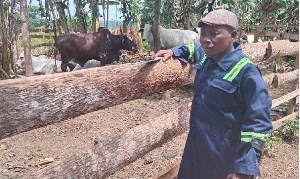The start of the new academic year in schools and universities across West Africa begins this month against a backdrop of problems ranging from teachers' strikes to socio-economic crises.
In Ghana, inflation has hit the population hard and many parents with schoolgoing children have seen fees rise by 50 percent.
Several private schools are charging an average of an additional 50 dollars to offset water and electricity charges.
The problems in adjoining Ivory Coast are similar, 1,991 teachers began a hunger strike ahead of the new session, which starts on September 17, to demand the payment of salary arrears for 12 months.
The government had promised to clear outstanding payments by July.
Ivorian Education Minister Michel Amani N'guessan, meanwhile, said he had added several new teaching posts in schools reducing the number of vacant posts from 3,786 to 2,891, despite the cash crunch.
Adding to the problem is a controversy over the release of funds to a new coffee-cocoa regulatory board. Some two million producers are worried over the deadlock and many say they don't have liquid cash to pay school fees.
Togo fares little better. Courses at Lome University partially resumed Monday after several months of interruption following a student strike launched in April to demand the payment of mounting scholarship arrears and better teaching facilities.
On August 30, the rector announced the annulment of the 2000-2001 academic year but said some other courses, which were not as badly affected, could be extended till mid-December to allow them to finish.
The same situation is mirrored in Niger where the national Niger Teachers' Association (SNEN) Tuesday said they would boycott the new academic session, slated to start on October 1.
The SNEN, the main teachers' grouping, accuses the government of going back on a pact signed in June between them and the government.
Since its independence in 1960, Niger -- the world's second poorest nation -- has a schoolgoing rate of 32 percent.
The university of Niger, meanwhile, has been paralyzed by a student protest since a student demonstration on February 21 led to violence and the death of a gendarme.
According to the secretary general of the national teachers' association, Seydou Maiga, the university does not even have adequate funds for the current session.
In Burkina Faso, the new term was scheduled for the start of September but has already been deferred by a month by the government. All indications are that it will be an unruly session.
Souleymane Kologo, general secretary of the powerful National Association of Burkinabe Students (ANEB), recently denounced "anti-social measures that are aggravating the lot of Burkinabe students."
The only exception seems to be tiny Benin, where the new session -- due to commence on October 1 -- will seemingly go off well.
The education budget has risen from 91 million dollars in 1990 to 194 million dollars in 1999.
The percentage of schoolgoing children during the period has also risen from 68.8 percent in 1996 to 76.49 percent in 1999, according to official figures.
General News of Thursday, 6 September 2001
Source: AFP












